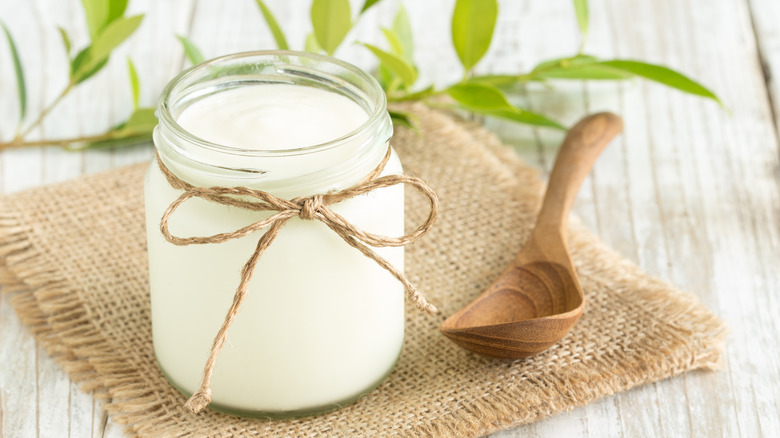Could Yogurt Be The Key To Preventing Bad Breath?
Bad breath, or halitosis, can ruin your confidence and self-esteem. You may feel too embarrassed to speak, share the bed with your partner, or stand close to others. Perhaps you've already tried mint drops, tongue brushes, and natural remedies, but nothing worked.
While it's possible to get rid of bad breath for good, you'll first have to figure out what's causing the problem. Halitosis may be due to oral bacteria, food buildup in the mouth, tooth or gum infections, or common oral lesions like thrush (candidiasis), herpes, or canker sores. In some cases, it's a symptom of diabetes, kidney disorders, peptic ulcers, liver disease, sinusitis, or other more serious conditions, according to clinical evidence published in the European Journal of Dentistry.
Bacteria buildup is a major contributing factor to bad breath. Your mouth is home to over 700 species of bacteria, fungi, and other microbes, says the National Institutes of Health. Some aid in digestion and ward off pathogens, whereas others can cause tooth decay and cavities. Research suggests that probiotics help reduce harmful bacteria in the mouth, which in turn may prevent or stop bad breath, notes the European Journal of Dentistry. As it turns out, yogurt and other probiotic-rich foods could have a similar effect.
Eating yogurt may help curb bad breath
Some people eat yogurt every day for its probiotic content. This creamy, delicious treat is rich in good bacteria that support gut health and digestive function. When consumed regularly, it may protect against diabetes, obesity, inflammation, and cardiovascular problems, notes Harvard T.H. Chan School of Public Health. Perhaps not surprisingly, the probiotic bacteria in yogurt and other foods may also help curb bad breath.
According to a recent review published in the journal BMJ Open, probiotics can eliminate halitosis for up to four weeks by reducing the levels of hydrogen sulfide and other volatile sulfur compounds in the month. Researchers investigated the effects of Lactobacillus reuteri, Lactobacillus salivarius, Streptococcus salivarius, and other probiotics in supplement form. These microorganisms also occur naturally in fermented foods, including yogurt. For example, Lactobacillus salivarius can be found in garlic, fermented milk products, bananas, chicory root, and other whole foods.
Another study suggests that probiotics may also help prevent or reduce cavities, gum disease, and plaque buildup, reports the journal Pharmaceutics. Both plaque buildup and gum disease can cause halitosis, so treating these conditions can lead to fresher breath. Moreover, probiotics help suppress inflammation and harmful oral bacteria while protecting the gums and surrounding tissues.
Reap the benefits of probiotics for oral health
Yogurt is made from pasteurized milk and live bacteria, such as Lactobacillus bulgaricus, L. acidophilus, and Bifidobacterium bifidum, explains Colorado State University. These microorganisms ferment lactose, a sugar in milk, and produce lactic acid, causing the milk to coagulate and thicken. Therefore, all yogurts have probiotic bacteria, but some also contain added sugar and other chemicals that can affect oral health.
The experts at Periodontal Associates of Memphis recommend eating a cup of plain yogurt daily to prevent bad breath. Go one step further and spice up your meals with anise, mint springs, coriander, parsley, basil, or tarragon to make your breath smell good throughout the day. Sugar-free chewing gum can help, too, as it increases saliva production and helps prevent dry mouth, a common cause of halitosis.
Now that you know the truth about probiotics, go ahead and include yogurt in your diet. Alternatively, opt for kefir, soft cheeses, or cultured buttermilk. If you're a vegan or have lactose intolerance, fill up on miso, kimchi, tempeh, pickles, kombucha, or sauerkraut, recommends One Green Planet. However, note that probiotics take time to work, and you might not get rid of bad breath if your problem is due to an underlying condition, such as liver disease or tooth infections.


